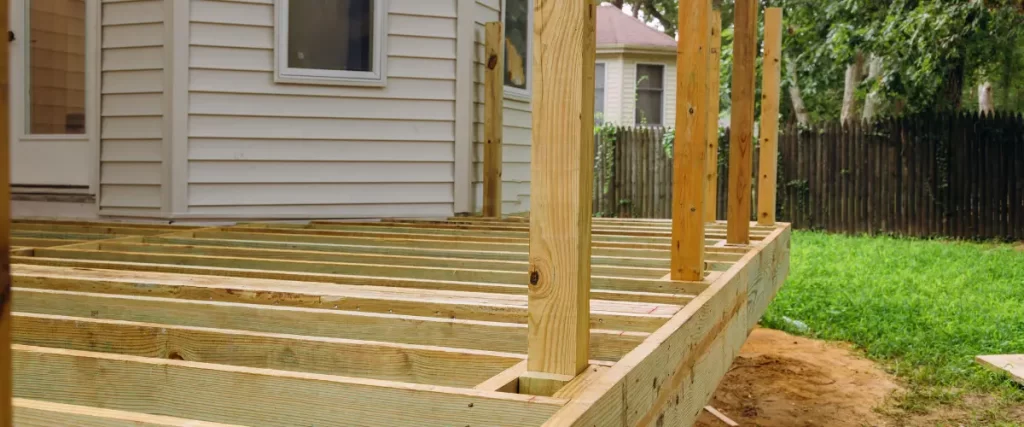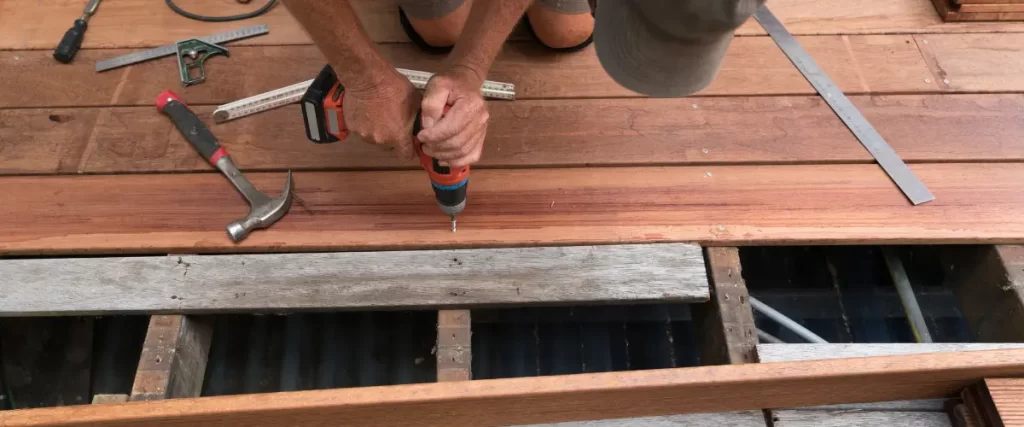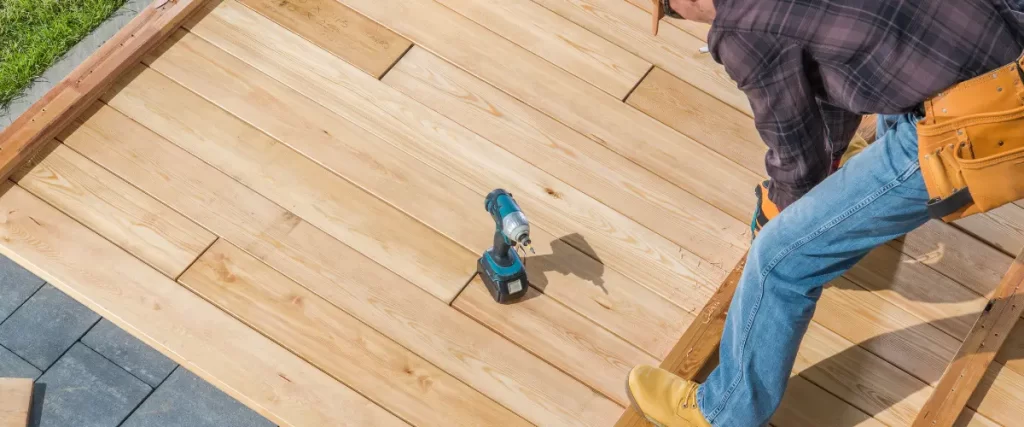Ever dreamed of adding a beautiful deck to your historic Council Bluffs home, but worried about navigating the preservation rules? You’re not alone. Many homeowners here face the same challenge: wanting to enhance their property while respecting the city’s rich history.
After all, Council Bluffs isn’t just any city; it’s a place where the past and present blend seamlessly, and that’s exactly what makes it so special.
But, that also means we have to be mindful when making changes to our homes, especially in older neighborhoods. Let’s be honest, it can feel a little daunting, right? You want to add value and enjoyment to your home, but you also want to do it right. So, let’s dive into the nitty-gritty of building a deck in our beloved historic city.

Understanding Council Bluffs’ Historic Preservation Guidelines
Council Bluffs is steeped in history, from its role as a key stop on the westward expansion to its beautiful Victorian-era homes. This heritage is protected by local preservation guidelines, designed to maintain the city’s character. When you’re thinking about deck building in historic Council Bluffs, the first step is understanding these guidelines.
You’ll find that the city has specific rules about materials, design, and even the placement of your deck. These rules aren’t meant to stifle your creativity, but rather to ensure that any additions to your home complement the existing architecture.
Think of it this way: your deck shouldn’t look like it was dropped in from another era. It should feel like a natural extension of your home. To get started, you’ll want to check out the City of Council Bluffs’ Historic Preservation Commission.
They have detailed information and resources available, and they’re there to help you through the process. You can find more information on the City of Council Bluffs Website.
Navigating the Permitting Process
Okay, so you’ve got a design in mind. Now comes the paperwork. The permitting process is crucial. You’ll need to submit your plans to the city, and they’ll review them to ensure they comply with the preservation guidelines. Don’t let this step intimidate you. It’s really just about ensuring everyone is on the same page.
Here’s a tip: get your plans reviewed early. This can save you a lot of time and headaches later on. If you wait until you’re halfway through construction to get approval, you might find yourself having to make costly changes.
Choosing the Right Materials for Your Historic Home
When it comes to materials, you’ll want to choose options that are both durable and historically appropriate. For example, if your home has a lot of natural wood features, you might want to consider using wood for your deck.
However, you’ll need to choose the right type of wood. Pressure-treated lumber is a popular choice, but you might also consider cedar or redwood for their natural resistance to rot and insects.
Composite decking is another option worth considering. It offers the look of wood without the maintenance.
Plus, it comes in a variety of colors and styles, so you can find something that complements your home’s aesthetic. Keep in mind, however, that the material must appear historically accurate. It must not look too modern.

Top Decking Manufacturers for Quality and Durability
Choosing the right manufacturer is crucial for a long-lasting deck. Quality materials ensure your deck stands up to Iowa’s weather.
- Trex: Known for high-performance composite decking, offering durability and low maintenance. They offer a wide range of color options.
- TimberTech: Provides premium composite and PVC decking, with realistic wood textures and long-lasting performance. They are known for their advanced technology.
- Fiberon: Offers eco-friendly composite decking options, with a focus on sustainability and style. They have a good reputation for their warranties.
- Deckorators: Specializes in composite decking with unique textures and finishes, enhancing outdoor living spaces. They focus on design and visual appeal.
- MoistureShield: Offers composite decking designed for moisture-rich environments, ideal for areas near water. They have a strong focus on water resistance.
Design Considerations: Blending Old and New
Designing a deck for a historic home is all about balance. You want to create a space that’s functional and stylish, but also respectful of the home’s history. This might mean incorporating design elements that echo the home’s original architecture.
For example, you might consider using railings that mimic the style of your home’s existing porch or fence.
Think about the scale of your deck. It shouldn’t overwhelm your home. A smaller, more intimate deck might be a better fit for a historic property. Consider the placement of your deck. Where will it be most functional? Where will it have the least impact on the home’s historic features? These are all important questions to ask.
Maintaining Historical Integrity During Construction
During construction, it’s crucial to minimize any damage to your home’s historic features. This might mean using hand tools instead of power tools in certain areas or taking extra care when excavating near existing foundations. You’ll also want to make sure that any contractors you hire are experienced in working on historic properties.
They’ll understand the importance of preserving the home’s character and will take the necessary precautions to avoid damage.
Landscaping and Outdoor Spaces: Complementing Your Deck
Your deck is just one part of your outdoor space. Think about how your landscaping can complement your deck and enhance your home’s overall aesthetic. You might consider planting native species or creating a garden that echoes the style of your home’s original landscaping.
Consider adding outdoor lighting to highlight your deck and landscaping at night. This can create a warm and inviting atmosphere, perfect for entertaining or relaxing.
Addressing Common Challenges in Historic Deck Building
Building a deck in a historic area comes with its own set of challenges. One common issue is dealing with uneven terrain. Many older properties have sloped yards or uneven foundations. This can make it difficult to build a level deck. However, there are solutions. You might consider using adjustable footings or building a multi-level deck to accommodate the terrain.
Another challenge is working with older materials. You might find that your home’s existing siding or foundation is fragile or damaged. This can make it difficult to attach your deck securely. In these cases, it’s best to consult with a structural engineer. They can assess the condition of your home and recommend the best course of action.
The Value of Professional Deck Builders
Let’s face it, tackling a deck project in a historic area is no small feat. That’s where professional deck builders come in. They have the experience and expertise to navigate the complexities of historic preservation and ensure your project is completed to the highest standards.
They can also help you with the permitting process, design, and material selection.
When choosing a deck builder, look for someone who has experience working on historic properties. Ask for references and look at their portfolio. Don’t be afraid to ask questions. A good deck builder will be happy to answer your questions and provide you with the information you need.
Enhancing Your Council Bluffs Lifestyle with a New Deck
Ultimately, building a deck is about more than just adding value to your home. It’s about creating a space where you can relax, entertain, and enjoy the beauty of Council Bluffs. Imagine sipping your morning coffee on your new deck, watching the sunrise over the city.
Or hosting a barbecue with friends and family, enjoying the warm summer evenings. A deck can truly transform your outdoor living experience.
By following these guidelines and working with experienced professionals, you can ensure that your deck is not only beautiful and functional, but also respectful of your home’s historic character.
Building a deck in historic Council Bluffs is an investment in your home and your lifestyle. It’s a way to create lasting memories and enjoy the unique charm of our city.
FAQ: Deck Building in Historic Council Bluffs
Q: Do I need a special permit to build a deck on a historic property?
A: Yes, in most cases, you will need to obtain a permit from the City of Council Bluffs. The process involves submitting your plans to the Historic Preservation Commission for review and approval. It’s important to contact the city’s planning department early in the process to understand the specific requirements for your property.
Q: What materials are best for a deck on a historic home?
A: Materials should complement the existing architecture. Natural wood, such as cedar or redwood, and composite decking that mimics the look of wood are popular choices. Ensure any materials you choose meet the city’s preservation guidelines.
Q: Can I use modern design elements in my deck?
A: While you can incorporate some modern elements, it’s crucial to maintain the historic character of your home. Focus on designs that blend seamlessly with the existing architecture and use materials that are historically appropriate.
Q: How do I find a contractor experienced in historic deck building?
A: Look for contractors with a portfolio that includes work on historic properties. Ask for references and check online reviews. Don’t hesitate to ask detailed questions about their experience with preservation guidelines and their approach to minimizing damage to historic features.

Trust Our Experienced Team
Our team has been delivering expert service in historic deck building for years. Working with professionals ensures top-quality results, saving you money long term. Contact us at (402) 369-5724 to get started today!
